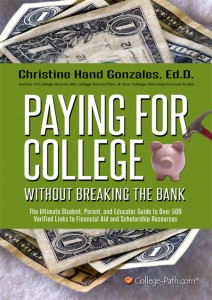 Don’t wait…get started with your search now with Paying for College Without Breaking the Bank: The Ultimate Student, Parents, and Educator Guide to Over 500 Live Links to Financial Aid and Scholarship Resources by Christine M. Hand Gonzales, Ed.D.
Don’t wait…get started with your search now with Paying for College Without Breaking the Bank: The Ultimate Student, Parents, and Educator Guide to Over 500 Live Links to Financial Aid and Scholarship Resources by Christine M. Hand Gonzales, Ed.D.
Paying for College Without Breaking the Bank takes you through the college planning timeline and the financial aid application process along with additional tips and resources. It will show ways to approach counselors, teachers, or moderators to request an effective letter of recommendation, and give tips on self-marketing through the scholarship application essays. It will help you:
- Calculate the actual costs of college
- Increase your chances of receiving aid
- Compare aid offers and learn how to appeal if needed
- Plan strategically as an independent student or divorced or single parent
- Avoid costly mistakes when applying
- Learn tips for completing the required federal form, the FAFSA
- Understand the “nuts and bolts” of financial aid, and where to find scholarships
- Access an extensive and incomparable list of publications and Internet resource
Available in eBook for $4.99 and paperback for $9.99! Click here for Amazon. Also on BarnesandNoble.com.
Click here for free downloads Reading Apps from Amazon for PC, Mac, iPad, and other devices for Kindle Version. Click here for free download Reading Apps from Barnes and Noble for PC, Mac, iPad and other devices for Nook Version.
 Do you have a passion for involvement in community service? Are you interested in the betterment of our society? Participating in community service is one way to give back, not a way to pad your resume. Start by thinking about your values and your interests.
Do you have a passion for involvement in community service? Are you interested in the betterment of our society? Participating in community service is one way to give back, not a way to pad your resume. Start by thinking about your values and your interests.









